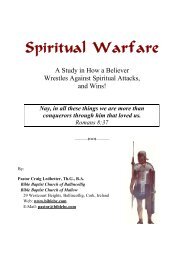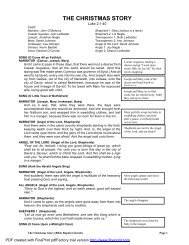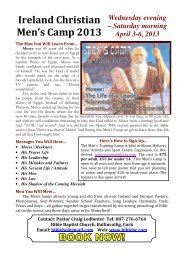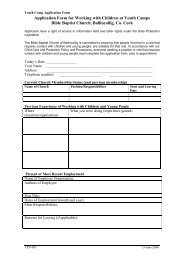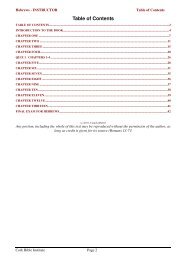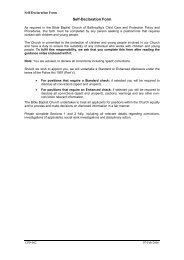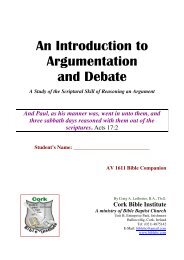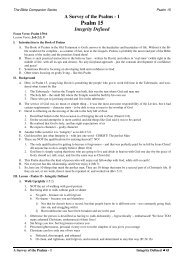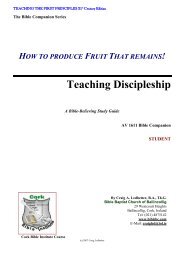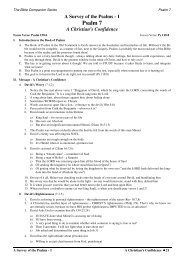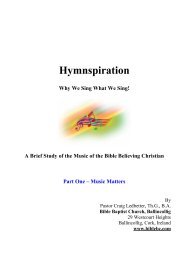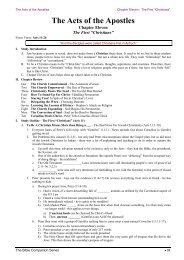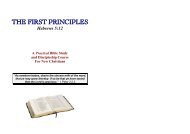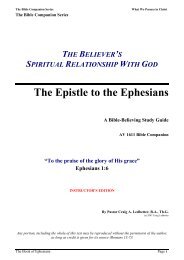Old Testament Survey - Student.pdf - Bible Baptist Church of Blarney
Old Testament Survey - Student.pdf - Bible Baptist Church of Blarney
Old Testament Survey - Student.pdf - Bible Baptist Church of Blarney
You also want an ePaper? Increase the reach of your titles
YUMPU automatically turns print PDFs into web optimized ePapers that Google loves.
<strong>Old</strong> <strong>Testament</strong> <strong>Survey</strong> – <strong>Student</strong> Edition<br />
Micah thru Malachi<br />
Nahum<br />
Comforting<br />
Author: The author <strong>of</strong> the Book <strong>of</strong> Nahum identifies himself as Nahum (in the Hebrew “Consoler”<br />
or “Comforter”) the Elkoshite (1:1). There are many theories as to where that city was though there is<br />
no conclusive evidence. One such theory is that it refers to the city later called Capernaum (which<br />
literally means “the village <strong>of</strong> Nahum”) at the Sea <strong>of</strong> Galilee.<br />
Date <strong>of</strong> Writing: Given the limited amount <strong>of</strong> information that we know about Nahum the best we<br />
can do is narrow the timeframe the Book <strong>of</strong> Nahum was written to between 663 and 612 B.C. Two<br />
events are mentioned that help us to determine these dates. First Nahum mentions Thebes (No Amon)<br />
in Egypt falling to the Assyrians (663 B.C.) in past tense so it had already happened. Secondly, the<br />
remainder <strong>of</strong> Nahum's prophecies came true in 612 B.C.<br />
Purpose <strong>of</strong> Writing: Nahum did not write this book as a warning or “call to repentance” for the<br />
people <strong>of</strong> Nineveh. God had already sent them the prophet Jonah 150 years earlier with His promise<br />
<strong>of</strong> what would happen if they continued in their evil ways. The people at that time had repented but<br />
now lived just as bad if not worse than they did before. The Assyrians had become absolutely brutal in<br />
their conquests (hanging the bodies <strong>of</strong> their victims on poles and putting their skin on the walls <strong>of</strong><br />
their tents among other atrocities). Now Nahum was telling the people <strong>of</strong> Judah to not despair because<br />
God had pronounced judgment and the Assyrians would soon be getting just what they deserved.<br />
Key Verses: Nahum 1:1a; Nahum 1:7; Nahum 1:14a; Nahum 1:15a, (See also Isaiah 52:7 and<br />
Romans 10:15); Nahum 2:13a; Nahum 3:19.<br />
Brief Summary: Though now <strong>of</strong>ten called one <strong>of</strong> the Minor Prophets Nahum carried a major<br />
message <strong>of</strong> hope for the people <strong>of</strong> Judah. The Ninevites (Assyrians) were well known for their cruelty<br />
when they invaded an area. But God (who had reserved His punishment 150 years earlier due to their<br />
repentance) had now pronounced judgment. The annihilators would now become the annihilated.<br />
In 612 B.C. the Babylonians and the Medes joined together and attacked the fortress city <strong>of</strong> Nineveh.<br />
The Ninevites lived inside walls 100ft high and wide enough for four chariots to ride abreast. They<br />
felt so secure in their stronghold that the king even gave wine to his soldiers to drink even though he<br />
knew the enemy was close. Still, God’s promise came true when He sent a flood and washed away<br />
part <strong>of</strong> the wall. The attackers rushed in and the drunken Assyrians ran away. The soldiers stopped<br />
chasing the Ninevites and plundered the city.<br />
Practical Application: Nineveh once had repented and served the Lord God Jehovah (see Jonah).<br />
That had changed over the course <strong>of</strong> 150 years. They had turned away from God again and so God<br />
was judging them. The same holds true for us today. God is patient. He gives every country time to<br />
proclaim Him as their Lord. But He is not mocked. Any time a country turns away from Him to serve<br />
it’s own motives He steps in with judgment. As Christians it is our duty to stand up for Biblical<br />
principles and Scriptural truth. We are our country’s only hope.<br />
Brief Outline <strong>of</strong> Nahum<br />
Nineveh's Just Judge (Ch. 1)<br />
Nineveh's Fall (Ch. 2)<br />
Nineveh's Ruin (Ch. 3)<br />
CBI - Practical Doctrine Page 98



